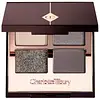What's inside
What's inside
 Key Ingredients
Key Ingredients

 Benefits
Benefits

 Concerns
Concerns

 Ingredients Side-by-side
Ingredients Side-by-side

Dimethicone
EmollientMica
Cosmetic ColorantTrimethylsiloxysilicate
EmollientSilica
AbrasiveSynthetic Wax
AbrasivePolyethylene
AbrasiveStearoxymethicone/Dimethicone Copolymer
EmollientStearyl Dimethicone
EmollientCaprylyl Methicone
Skin ConditioningCalcium Sodium Borosilicate
Octadecene
SolventCopernicia Cerifera Wax
Polysilicone-11
Disteardimonium Hectorite
StabilisingCaprylic/Capric Triglyceride
MaskingPentaerythrityl Tetra-Di-T-Butyl Hydroxyhydrocinnamate
AntioxidantPropylene Carbonate
SolventPolyhydroxystearic Acid
EmulsifyingBrassica Campestris Seed Oil
Skin ConditioningRicinus Communis Seed Oil
MaskingSodium Hyaluronate
HumectantHydrogenated Castor Oil
EmollientPolygonum Tinctorium Leaf Extract
Skin ConditioningDicalcium Phosphate
AbrasiveRubus Idaeus Leaf Extract
Skin ConditioningBHT
AntioxidantTitanium Dioxide
Cosmetic ColorantCI 77491
Cosmetic ColorantCI 77492
Cosmetic ColorantCI 77499
Cosmetic ColorantCI 42090
Cosmetic ColorantCI 77000
Cosmetic ColorantDimethicone, Mica, Trimethylsiloxysilicate, Silica, Synthetic Wax, Polyethylene, Stearoxymethicone/Dimethicone Copolymer, Stearyl Dimethicone, Caprylyl Methicone, Calcium Sodium Borosilicate, Octadecene, Copernicia Cerifera Wax, Polysilicone-11, Disteardimonium Hectorite, Caprylic/Capric Triglyceride, Pentaerythrityl Tetra-Di-T-Butyl Hydroxyhydrocinnamate, Propylene Carbonate, Polyhydroxystearic Acid, Brassica Campestris Seed Oil, Ricinus Communis Seed Oil, Sodium Hyaluronate, Hydrogenated Castor Oil, Polygonum Tinctorium Leaf Extract, Dicalcium Phosphate, Rubus Idaeus Leaf Extract, BHT, Titanium Dioxide, CI 77491, CI 77492, CI 77499, CI 42090, CI 77000
Talc
AbrasiveMica
Cosmetic ColorantCalcium Sodium Borosilicate
Octyldodecyl Stearoyl Stearate
EmollientDimethicone
EmollientZinc Stearate
Cosmetic ColorantCalcium Aluminum Borosilicate
Diisostearyl Malate
EmollientCaprylic/Capric Triglyceride
MaskingZea Mays Starch
AbsorbentSilica
AbrasiveHydrogenated Castor Oil Hydroxystearate
Skin ConditioningPentaerythrityl Tetraisostearate
EmollientPotassium Sorbate
PreservativeChlorphenesin
AntimicrobialPolyethylene
AbrasiveIsononyl Isononanoate
Emollient1,2-Hexanediol
Skin ConditioningCaprylyl Glycol
EmollientTin Oxide
AbrasiveCaprylyl Methicone
Skin ConditioningTetrasodium EDTA
Zeolite
AbsorbentDimethiconol
EmollientSorbic Acid
PreservativeMethylparaben
PreservativePropylparaben
PreservativeButylparaben
MaskingBHT
AntioxidantTrimethylsiloxysilicate
EmollientUltramarines
CI 77007
Cosmetic ColorantCI 75470
Cosmetic ColorantCI 77510
Cosmetic ColorantBlue 1 Lake
Cosmetic ColorantCI 42090
Cosmetic ColorantTitanium Dioxide
Cosmetic ColorantCI 77891
Cosmetic ColorantCI 77742
Cosmetic ColorantIron Oxides
CI 77492
Cosmetic ColorantCI 77499
Cosmetic ColorantCI 77491
Cosmetic ColorantTalc, Mica, Calcium Sodium Borosilicate, Octyldodecyl Stearoyl Stearate, Dimethicone, Zinc Stearate, Calcium Aluminum Borosilicate, Diisostearyl Malate, Caprylic/Capric Triglyceride, Zea Mays Starch, Silica, Hydrogenated Castor Oil Hydroxystearate, Pentaerythrityl Tetraisostearate, Potassium Sorbate, Chlorphenesin, Polyethylene, Isononyl Isononanoate, 1,2-Hexanediol, Caprylyl Glycol, Tin Oxide, Caprylyl Methicone, Tetrasodium EDTA, Zeolite, Dimethiconol, Sorbic Acid, Methylparaben, Propylparaben, Butylparaben, BHT, Trimethylsiloxysilicate, Ultramarines, CI 77007, CI 75470, CI 77510, Blue 1 Lake, CI 42090, Titanium Dioxide, CI 77891, CI 77742, Iron Oxides, CI 77492, CI 77499, CI 77491
 Reviews
Reviews

Ingredients Explained
These ingredients are found in both products.
Ingredients higher up in an ingredient list are typically present in a larger amount.
BHT is a synthetic antioxidant and preservative.
As an antioxidant, it helps your body fight off free-radicals. Free-radicals are molecules that may damage your skin cells.
As a preservative, it is used to stabilize products and prevent them from degrading. Specifically, BHT prevents degradation from oxidation.
The concerns related to BHT come from oral studies; this ingredient is currently allowed for use by both the FDA and EU.
However, it was recently restricted for use in the UK as of April 2024.
Learn more about BHTCalcium Sodium Borosilicate is a bulking agent. It is considered a borosilicate glass; it is composed of powder or flakes of calcium and sodium borosilicates.
This ingredient is used to add volume, shine, and color to products. You'll most likely find this ingredient in makeup products.
According to in-vivo and ex-vivo studies done by a manufacturer, this ingredient works well with UV filters:
Learn more about Calcium Sodium BorosilicateThis ingredient is an emollient, solvent, and texture enhancer. It is considered a skin-softener by helping the skin prevent moisture loss.
It helps thicken a product's formula and makes it easier to spread by dissolving clumping compounds.
Caprylic Triglyceride is made by combining glycerin with coconut oil, forming a clear liquid.
While there is an assumption Caprylic Triglyceride can clog pores due to it being derived from coconut oil, there is no research supporting this.
Learn more about Caprylic/Capric TriglycerideCaprylyl Methicone is a type of silicone.
It helps soften and soothe the skin by creating a thin film on top. This film helps trap moisture, keeping your skin hydrated.
Ci 42090 is a synthetic dye created from petroleum. It is used to give a bright blue color to cosmetics, medicine, and food.
Ci 77491 is also hydrated iron III oxide. It's sole purpose is to give a red/pink hue to products.
Iron III oxides are classified as inorganic chemicals for coloring.
Synthetically created Ci 77491 is considered safer than those naturally found. This is because the synthetically created version may contain less impurities. Iron oxides are generally non-toxic and non-allergenic.
Learn more about CI 77491Ci 77492 is also hydrated iron III oxide. It's sole purpose is to give a yellow hue to products.
Iron III oxides are classified as inorganic chemicals for coloring.
Synthetically created Ci 77492 is considered safer than those naturally found. This is because the synthetically created version may contain less impurities. Iron oxides are generally non-toxic and non-allergenic.
Learn more about CI 77492Ci 77499 is also hydrated iron III oxide. It is created from mixing red and black iron oxides. This helps give shades of darkness to a product.
Iron III oxides are classified as inorganic chemicals for coloring.
Dimethicone is a type of synthetic silicone created from natural materials such as quartz.
What it does:
Dimethicone comes in different viscosities:
Depending on the viscosity, dimethicone has different properties.
Ingredients lists don't always show which type is used, so we recommend reaching out to the brand if you have questions about the viscosity.
This ingredient is unlikely to cause irritation because it does not get absorbed into skin. However, people with silicone allergies should be careful about using this ingredient.
Note: Dimethicone may contribute to pilling. This is because it is not oil or water soluble, so pilling may occur when layered with products. When mixed with heavy oils in a formula, the outcome is also quite greasy.
Learn more about DimethiconeMica is a naturally occurring mineral used to add shimmer and color in cosmetics. It can also help improve the texture of a product or give it an opaque, white/silver color.
Serecite is the name for very fine but ragged grains of mica.
This ingredient is often coated with metal oxides like titanium dioxide. Trace amounts of heavy metals may be found in mica, but these metals are not harmful in our personal products.
Mica has been used since prehistoric times throughout the world. Ancient Egyptian, Indian, Greek, Roman, Aztec, and Chinese civilizations have used mica.
Learn more about MicaPolyethylene is a synthetic ingredient that helps the skin retain moisture. It is a polymer.
It is also typically used within product formulations to help bind solid ingredients together and thicken oil-based ingredients. When added to balms and emulsions, it helps increase the melting point temperature.
Silica, also known as silicon dioxide, is a naturally occurring mineral. It is used as a fine, spherical, and porous powder in cosmetics.
Though it has exfoliant properties, the function of silica varies depending on the product.
The unique structure of silica enhances the spreadability and adds smoothness, making it a great texture enhancer.
It is also used as an active carrier, emulsifier, and mattifier due to its ability to absorb excess oil.
In some products, tiny microneedles called spicules are made from silica or hydrolyzed sponge. When you rub them in, they lightly polish away dead skin layers and enhance the penetration of active ingredients.
Learn more about SilicaTitanium dioxide is a mineral UV filter widely used in sunscreens and cosmetics.
It is one of only two UV filters officially classified as “mineral” by regulatory agencies, the other being zinc oxide.
Titanium dioxide provides broad-spectrum protection mostly in the UVB and UVAII range, with some protection in the UVAI range.
While its UVA protection isn’t as strong as zinc oxide’s, the difference is minor.
A common myth is that mineral UV filters reflect UV light. However, modern research shows titanium dioxide absorbs UV radiation like chemical filters (~95% absorption & 5% reflection).
Thanks to its non-irritating nature, titanium dioxide is suitable for sensitive, acne-prone, or redness-prone skin. It is unlikely to cause "eye sting" like other sunscreen ingredients.
A major drawback of this ingredient is its white cast and thick texture. This is why mineral sunscreens often leave a white cast and are less cosmetically elegant than chemical/hybrid sunscreens.
To improve white cast and spreadability, micronized or nano-sized titanium dioxide is often used.
There are ongoing concerns surrounding nano-titanium oxide's impact on marine ecosystems.
There is no conclusive evidence that any form of titanium oxide (or any other sunscreen ingredients) will cause harm to marine ecosystems or coral reefs. The science is still developing but many consumers are keeping a close eye on this issue.
Please note, many destinations have reef-safety sunscreen rules. For instance, the U.S. Virgin Islands advises all visitors to use non-nano mineral sunscreens.
Nano mineral sunscreens once raised safety concerns about absorption into skin.
Extensive research has shown that they do not penetrate healthy or damaged skin; they remain safely on the surface and the top layer of dead skin (stratum corneum).
You'll likely find titanium dioxide bundled with alumina, silica, or dimethicone. These ingredients help make titanium dioxide highly photostable; this prevents it from interacting with other formula components under UV light.
Learn more about Titanium DioxideThis silicone is an emollient. Emollients create a thin film on the skin to prevent moisture from escaping.
It is not soluble in water and helps increase water-resistance in products.
According to a manufacturer, it can blend seamlessly with silicone oils, such as Cyclopentasiloxane.
Learn more about Trimethylsiloxysilicate